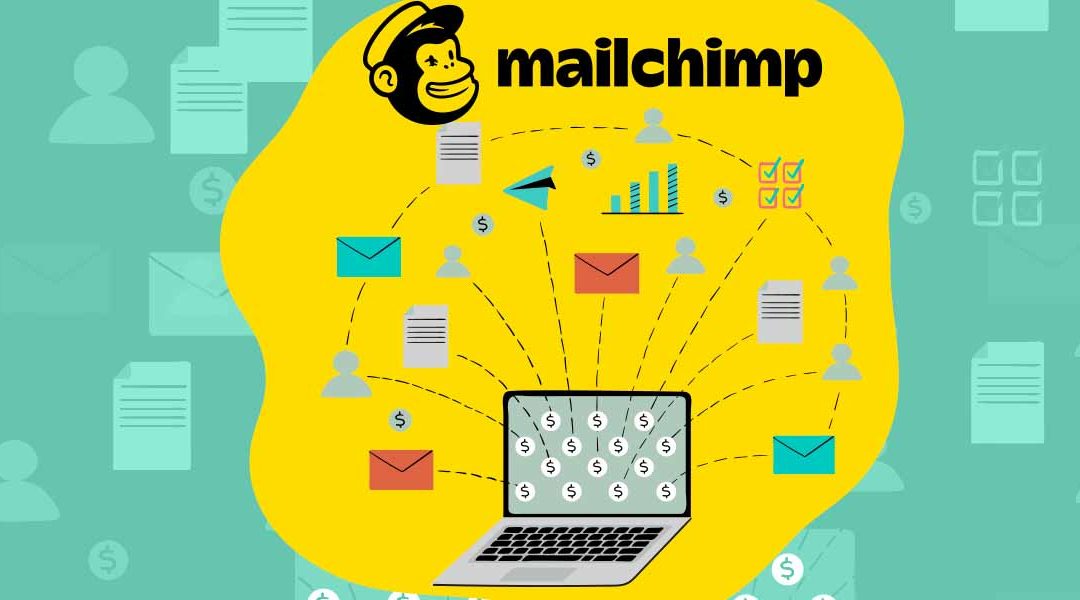Top 11 E-commerce Marketing Automation Tools
Table of Content
In today’s highly competitive online marketplace, e-commerce businesses require effective marketing tools to streamline their efforts and expand their reach. E-commerce marketing automation is the key to achieving this, as it enables companies to automate repetitive operations, target customers with targeted campaigns, and easily analyze performance. With the correct tools, you can dramatically improve your marketing strategies and increase revenue.
One of the most important aspects of e-commerce marketing automation is the usage of powerful e-commerce CRM technologies. These technologies assist organizations in managing client interactions by offering insights into their behavior, preferences, and purchasing history. Using these insights, you can design targeted marketing campaigns that connect with your target demographic, resulting in increased engagement and conversion rates.
In this blog, we will discuss what e-commerce marketing automation is and why it’s essential for online businesses. Finally, we’ll present our list of the top 11 e-commerce marketing automation tools and address some frequently asked questions.
What is E-commerce Marketing Automation
E-commerce marketing automation involves using marketing automation software to streamline and automate repetitive marketing tasks for online businesses. By integrating e-commerce CRM tools, businesses can manage customer relationships more effectively, personalize marketing campaigns, and enhance overall customer engagement. This automation helps in optimizing marketing efforts and boosting sales through targeted, data-driven strategies.
Benefits of Marketing Automation Software
1. Streamlined Processes
E-commerce automation significantly reduces the manual workload involved in executing repetitive marketing tasks. By automating processes such as email marketing, social media postings, and ad campaigns, businesses can ensure that these activities are carried out consistently and efficiently.
This not only saves time but also reduces the chances of human error, allowing marketing teams to focus on more strategic, creative tasks that can drive business growth.
2. Improved Customer Relationship Management

Marketing automation software works hand-in-hand with e-commerce CRM tools to provide a comprehensive view of customer interactions and journeys. This integration helps businesses manage leads more effectively and nurture customer relationships through personalized communication.
By having a unified view of customer data, businesses can better understand customer needs and tailor their marketing efforts accordingly, enhancing the overall customer experience and fostering loyalty.
3. Data-Driven Insights
The analytics and reporting capabilities of marketing automation software provide businesses with invaluable data-driven insights. By tracking and analyzing campaign performance metrics, businesses can measure ROI, identify successful strategies, and pinpoint areas for improvement.
This data-centric approach enables more informed decision-making, helping businesses optimize their marketing efforts and allocate resources more efficiently.
4. Increased Efficiency and Productivity
Automating routine marketing tasks not only streamlines processes but also significantly boosts efficiency and productivity within marketing teams. By handling time-consuming activities automatically, marketing automation software allows teams to focus on more impactful tasks, such as developing innovative marketing strategies and creating compelling content.
This increased productivity leads to better overall performance and allows businesses to achieve their marketing goals more effectively.
5. Enhanced Customer Segmentation
One of the most powerful features of marketing automation software is its ability to segment customers effectively. By integrating with e-commerce CRM tools, businesses can analyze customer data to group customers based on behaviors, preferences, purchase history, and other relevant factors.
This enables the creation of highly targeted marketing campaigns that resonate with specific customer segments, resulting in increased engagement, higher conversion rates, and improved customer satisfaction.
Top 11 E-commerce Marketing Automation Tools
1. Klaviyo
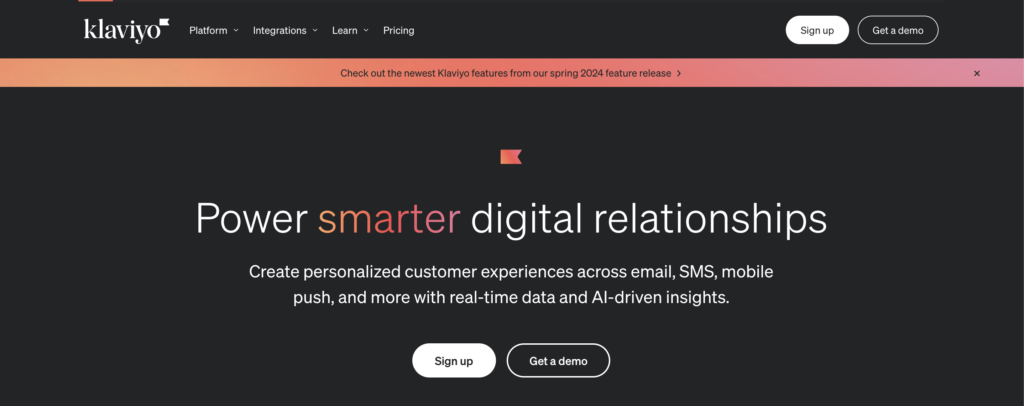
Klaviyo is a leading e-commerce CRM tool platform designed to integrate seamlessly with e-commerce stores like Shopify and WooCommerce. It allows businesses to use advanced segmentation and automation to create personalized email and SMS campaigns based on customer behavior and purchase history.
2. HubSpot
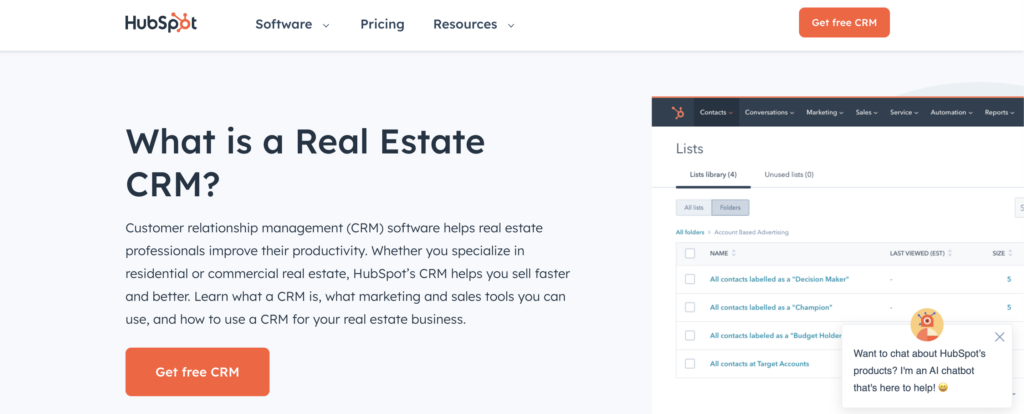
HubSpot offers a comprehensive suite of marketing automation software, including email marketing, social media management, and e-commerce CRM tools. Its all-in-one platform is perfect for managing the entire marketing funnel from lead generation to customer retention. HubSpot’s user-friendly interface and powerful analytics capabilities make it an excellent choice for e-commerce businesses looking to streamline their marketing operations.
3. Mailchimp
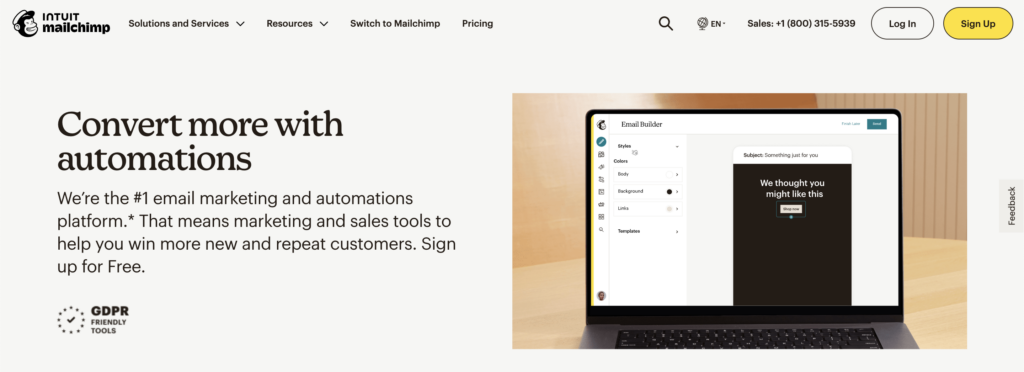
Mailchimp has evolved from an email marketing service into a full-fledged marketing automation software. It provides tools for email marketing, social media advertising, landing pages, and e-commerce CRM tools. Mailchimp’s ease of use and extensive integration options make it a versatile and popular choice for e-commerce businesses of all sizes.
4. ActiveCampaign
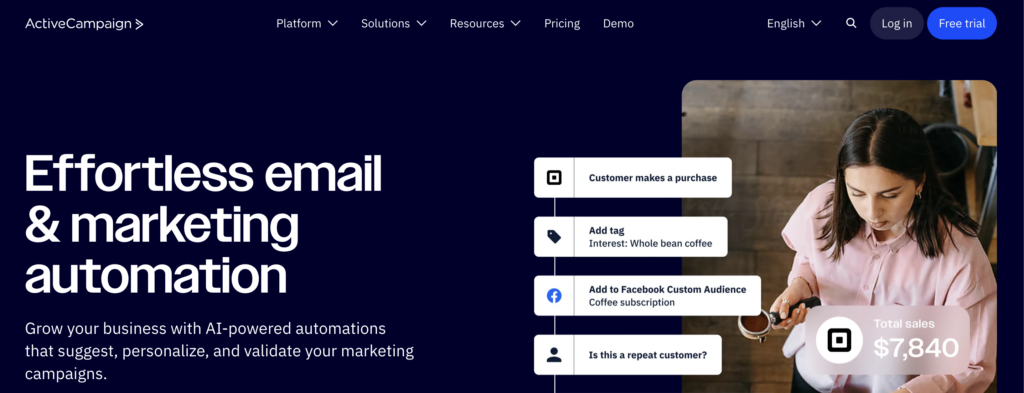
ActiveCampaign combines email marketing, automation, and e-commerce CRM tools to help businesses deliver highly personalized customer experiences. Its advanced automation workflows can be triggered based on customer actions such as purchases or abandoned carts. ActiveCampaign’s powerful segmentation capabilities ensure precise targeting and enhanced customer engagement.
5. Omnisend

Omnisend is an e-commerce marketing automation platform that focuses on omnichannel marketing, supporting email, SMS, push notifications, and more. It enables businesses to create cohesive and personalized customer journeys with its pre-built automation workflows. Omnisend’s easy integration with e-commerce platforms makes it a favorite among online retailers.
6. Drip
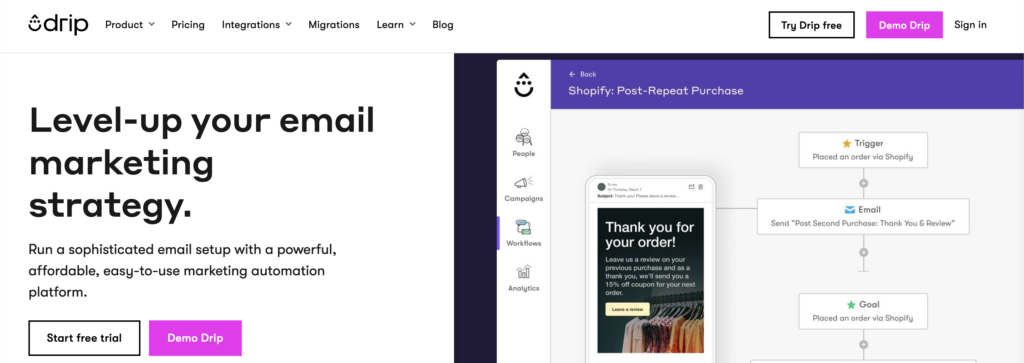
Drip is an e-commerce CRM and marketing software designed to help businesses create personalized marketing campaigns. It offers advanced segmentation, automation workflows, and robust analytics to optimize marketing efforts. Drip’s focus on personalization and customer engagement makes it an excellent tool for nurturing customer relationships.
7. GetResponse

GetResponse is an all-in-one marketing platform offering email marketing, automation, and e-commerce CRM tools. It includes features for creating landing pages, webinars, and sales funnels, making it a versatile solution for e-commerce businesses. GetResponse’s comprehensive feature set and ease of use make it suitable for businesses looking to centralize their marketing efforts.
8. Sendinblue
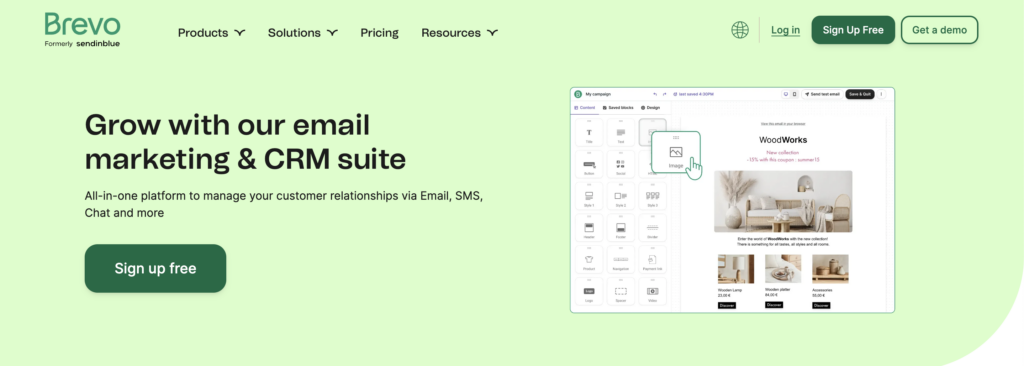
Sendinblue combines email marketing, SMS marketing, and e-commerce CRM tools into one marketing automation platform. It offers a wide range of automation features, including transactional emails, workflows, and retargeting ads. Sendinblue’s affordability and extensive feature set make it a great choice for small to medium-sized e-commerce businesses.
9. Pardot

Pardot, a Salesforce product, is a B2B marketing automation software that also caters to e-commerce businesses. It offers tools for lead generation, email marketing, and customer segmentation. Pardot’s integration with Salesforce CRM provides a seamless experience for managing customer relationships and tracking marketing performance.
10. Marketo
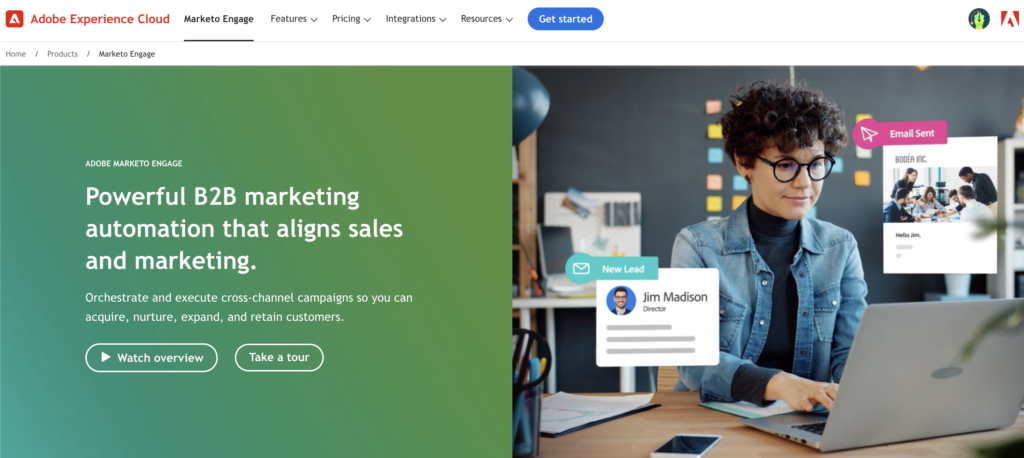
Marketo, an Adobe company, is a premier marketing automation software known for its robust capabilities in email marketing, lead management, and analytics. It offers advanced automation workflows and personalization features, making it ideal for large e-commerce businesses with complex marketing needs. Marketo’s powerful analytics tools help businesses measure and optimize their marketing efforts.
11. Bronto
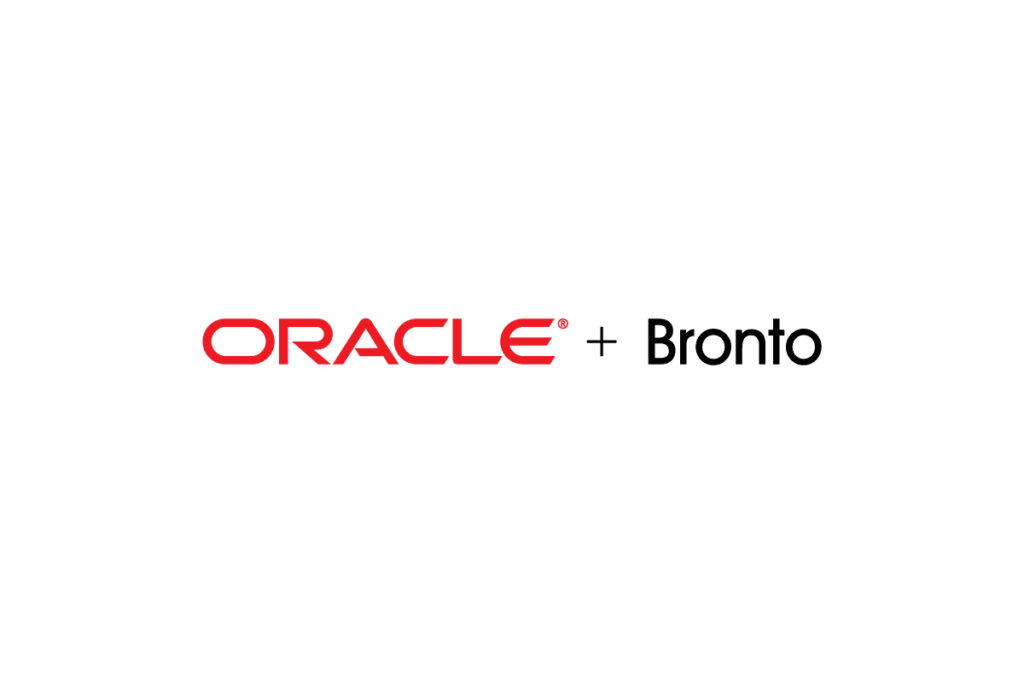
Bronto, part of Oracle’s suite of marketing tools, is specifically designed for e-commerce businesses. It offers email marketing, automation, and CRM tools tailored to online retailers. Bronto’s advanced segmentation, cart abandonment solutions, and detailed reporting capabilities help businesses drive sales and improve customer retention.
Robylon AI improves e-commerce marketing automation by customizing workflow creation, enhancing efficiency, and enabling seamless integration across different tools and platforms.
Want to know more? Schedule a demo with us.
FAQs
1. What types of tasks can be automated using e-commerce marketing automation?
Tasks that can be automated include email marketing campaigns (welcome series, abandoned cart reminders), social media scheduling and posting, personalized product recommendations based on customer behavior, customer segmentation, and lead nurturing workflows.
2. How does e-commerce marketing automation help in increasing sales?
By delivering targeted and timely messages to customers, e-commerce automation helps in nurturing leads through the sales funnel more effectively. It reduces cart abandonment rates, improves customer retention, and encourages repeat purchases through personalized offers and recommendations.
3. What metrics should businesses track with e-commerce automation?
Businesses should track metrics such as email open rates, click-through rates, conversion rates, customer lifetime value (CLV), ROI of marketing campaigns, and customer engagement metrics. These metrics provide insights into the effectiveness of marketing efforts and help in optimizing strategies.
4. How can small businesses benefit from e-commerce CRM automation?
E-commerce CRM automation allows small businesses to compete more effectively by automating repetitive tasks, reducing operational costs, reaching customers with personalized messages, and scaling marketing efforts without increasing resource requirements.
5. What are some common challenges with implementing e-commerce marketing automation?
Common challenges include selecting the right software that meets business needs, ensuring data integration between platforms, maintaining data accuracy, creating effective automation workflows, and adapting strategies based on changing customer behavior and market trends.
6. How can businesses measure the ROI of e-commerce CRM automation?
Businesses can measure ROI by comparing the costs saved from automation (such as reduced labor costs and improved efficiency) with the revenue generated from automated campaigns. Tracking conversions attributed to automated workflows and analyzing customer behavior data are also essential for measuring ROI accurately.





